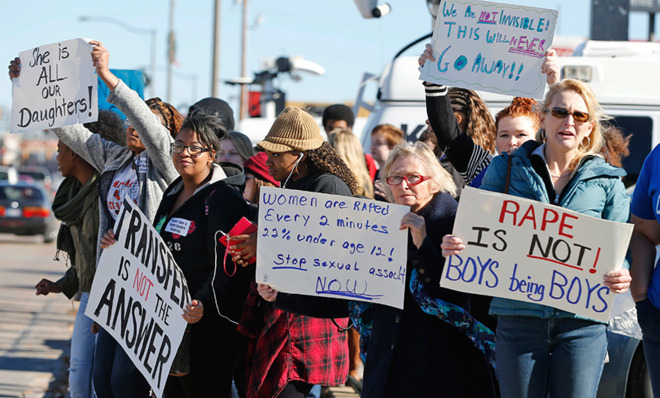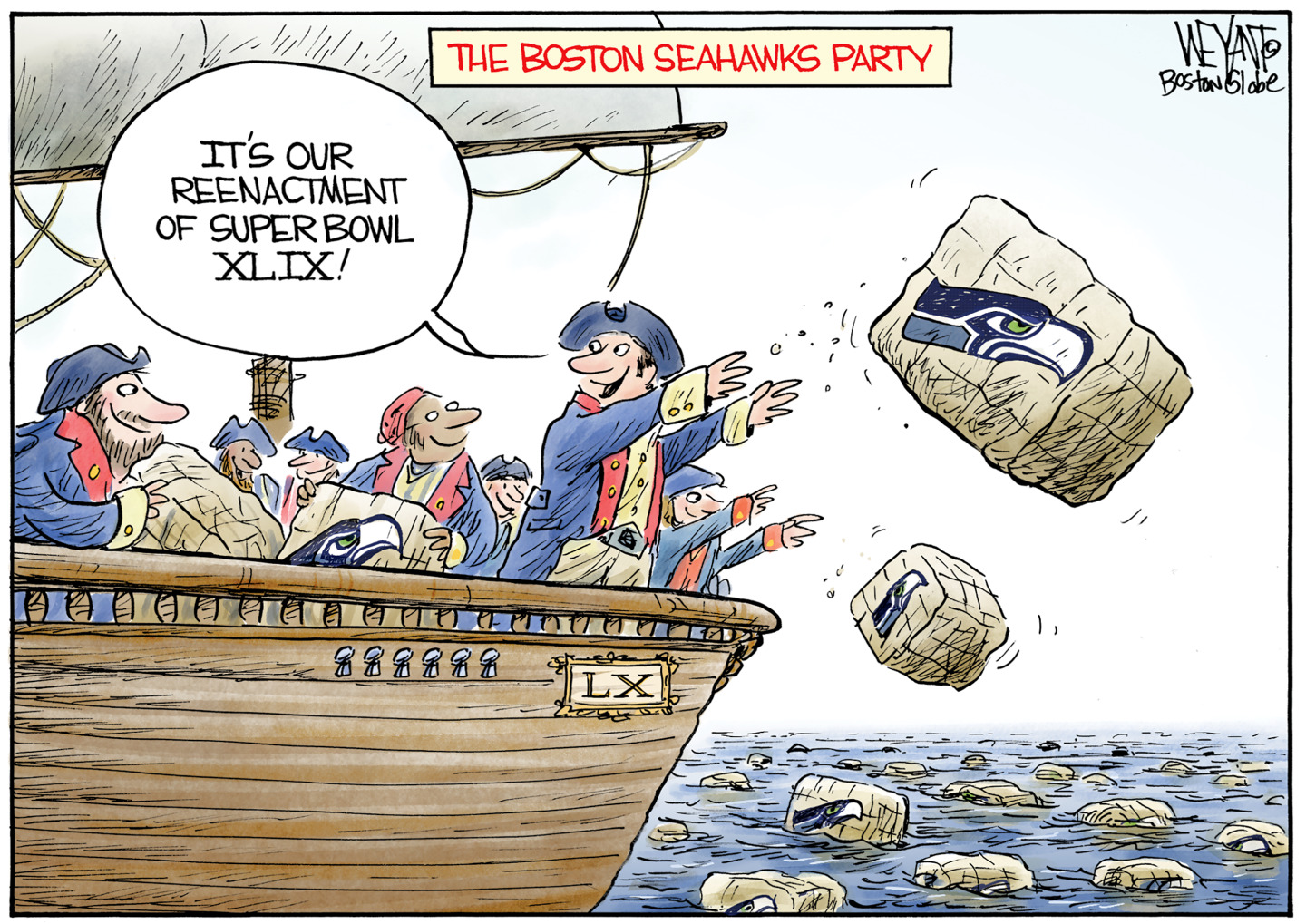How rape became a partisan issue
It's no coincidence that conservatives were the first to express skepticism about Rolling Stone's UVA gang rape story


A free daily email with the biggest news stories of the day – and the best features from TheWeek.com
You are now subscribed
Your newsletter sign-up was successful
When I was a student in college, a comment in the campus newspaper offended me.
A fellow student, who I knew to be a bright and well-meaning young man, said (I'm paraphrasing from memory), "I'm proud as a progressive to stand against rape."
I interpreted him to mean that being against rape was a progressive cause — and one that non-progressives oppose. He lived in a co-ed house dedicated to "peace and justice" where, in the spirit of communal living, they all shared one voicemail inbox.
The Week
Escape your echo chamber. Get the facts behind the news, plus analysis from multiple perspectives.

Sign up for The Week's Free Newsletters
From our morning news briefing to a weekly Good News Newsletter, get the best of The Week delivered directly to your inbox.
From our morning news briefing to a weekly Good News Newsletter, get the best of The Week delivered directly to your inbox.
I left him a message. "Being against rape is not a left-right issue or a partisan issue," I protested. "It is the position of all decent people!" Several of his progressive housemates, male and female, contacted me to agree.
Is rape now a partisan issue?
It would appear so. Hundreds reportedly plan to protest a Michigan State University commencement address by the conservative columnist George Will. Why? Will wrote a column questioning some claims about the frequency of sexual assault on college campuses and averring that when colleges "make victimhood a coveted status that confers privileges, victims proliferate."
Will was dubbed a rape apologist and a campaign was initiated to get newspapers to drop his widely syndicated column.
A free daily email with the biggest news stories of the day – and the best features from TheWeek.com
George Will wasn't the first conservative to find himself so described.
In 2011, a Republican bill prohibiting taxpayer funding of abortion listed "forcible rape" as an exception. This was seen as implying there was some other kind, an absurdity that the comedian Whoopi Goldberg highlighted by noting the distinction between "rape" and "rape rape."
A year later, Todd Akin suggested such exceptions were really unnecessary in cases of "legitimate rape." He cost Republicans what had been a winnable Senate seat in Missouri and they've been fighting the "war on women" ever since.
The right's fraught relationship with the issue has surfaced again, thanks to a now-ubiquitous Rolling Stone story about an alleged rape at a UVA fraternity house, which turned out to be at best poorly reported and at worst a fabrication. The early skeptics whose scrutiny unraveled the piece were mostly conservatives and libertarians.
Not all of them, as National Review's Charles C.W. Cooke noted. "Thus far we have seen excellent, disinterested reporting on the case from Slate, The Washington Post, and The New Republic, among others," he wrote.
But the question Cooke sought to answer in that post — "Why are conservatives so invested in debunking the Rolling Stone story?" — didn't come from nowhere.
What is it about rape and the right? From prattling about "legitimate rape" to outing the woman making the allegations in the Rolling Stone story (and apparently getting it wrong), there are plenty examples of conservatives behaving badly on this question.
But college campuses are also adopting extremely loose evidentiary standards for rape and other forms of sexual assault that seem likely to ensnare innocent people, even if the overwhelming majority of properly adjudicated rape claims are true.
Now some commentators are coming dangerously close to arguing that we should abandon the presumption of innocence off-campus, where the authorities have the power not just to expel but to imprison.
At issue isn't disbelief of women in general or rape survivors in particular. It's understanding that the seriousness of a crime — and rape, with its violation of bodily integrity is perhaps the most serious crime short of murder — is separate from determining guilt or innocence.
We also know from our history that some methods for making those determinations are more susceptible to error and abuse than others.
The temptation to throw out the red tape is understandable. As horrible as rape is, it is also an extremely difficult crime to prove. The window in which physical evidence exists is relatively short. There are often no witnesses. Important questions turn on intention and "he said, she said."
When you take into account other psychological factors and practical considerations that make rape victims hesitate to come forward at all, there is little wonder rape is underreported.
Imagine watching your rapist go free. Or maybe even become America's dad.
It's enough to make one view this as a zero-sum conflict in which innocent men or raped women must necessarily lose.
But not enough to give up hard-fought constitutional protections — which shouldn't be a partisan issue either.
W. James Antle III is the politics editor of the Washington Examiner, the former editor of The American Conservative, and author of Devouring Freedom: Can Big Government Ever Be Stopped?.
-
 American empire: a history of US imperial expansion
American empire: a history of US imperial expansionDonald Trump’s 21st century take on the Monroe Doctrine harks back to an earlier era of US interference in Latin America
-
 Elon Musk’s starry mega-merger
Elon Musk’s starry mega-mergerTalking Point SpaceX founder is promising investors a rocket trip to the future – and a sprawling conglomerate to boot
-
 5 superbly funny cartoons about the Superbowl
5 superbly funny cartoons about the SuperbowlCartoons Artists take on historical reenactment, biased bowls, and more
-
 The billionaires’ wealth tax: a catastrophe for California?
The billionaires’ wealth tax: a catastrophe for California?Talking Point Peter Thiel and Larry Page preparing to change state residency
-
 Bari Weiss’ ‘60 Minutes’ scandal is about more than one report
Bari Weiss’ ‘60 Minutes’ scandal is about more than one reportIN THE SPOTLIGHT By blocking an approved segment on a controversial prison holding US deportees in El Salvador, the editor-in-chief of CBS News has become the main story
-
 Has Zohran Mamdani shown the Democrats how to win again?
Has Zohran Mamdani shown the Democrats how to win again?Today’s Big Question New York City mayoral election touted as victory for left-wing populists but moderate centrist wins elsewhere present more complex path for Democratic Party
-
 Millions turn out for anti-Trump ‘No Kings’ rallies
Millions turn out for anti-Trump ‘No Kings’ ralliesSpeed Read An estimated 7 million people participated, 2 million more than at the first ‘No Kings’ protest in June
-
 Ghislaine Maxwell: angling for a Trump pardon
Ghislaine Maxwell: angling for a Trump pardonTalking Point Convicted sex trafficker's testimony could shed new light on president's links to Jeffrey Epstein
-
 The last words and final moments of 40 presidents
The last words and final moments of 40 presidentsThe Explainer Some are eloquent quotes worthy of the holders of the highest office in the nation, and others... aren't
-
 The JFK files: the truth at last?
The JFK files: the truth at last?In The Spotlight More than 64,000 previously classified documents relating the 1963 assassination of John F. Kennedy have been released by the Trump administration
-
 'Seriously, not literally': how should the world take Donald Trump?
'Seriously, not literally': how should the world take Donald Trump?Today's big question White House rhetoric and reality look likely to become increasingly blurred
